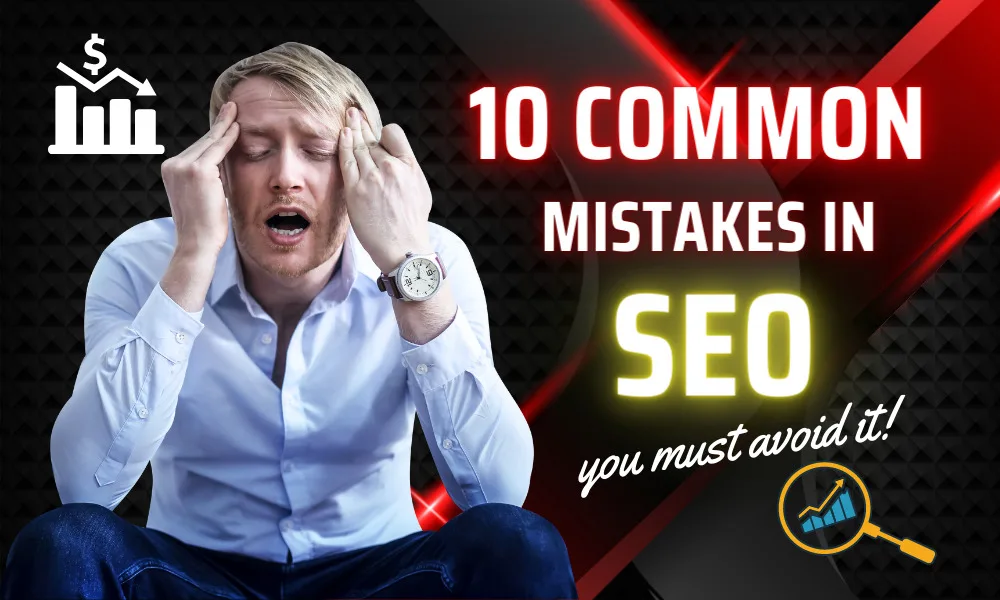Introduction
Search Engine Optimization (SEO) is crucial for businesses to enhance their online visibility and attract organic traffic. However, many website owners unknowingly make mistakes that can hinder their SEO efforts. In this article, we will explore 10 common SEO mistakes and provide actionable solutions to fix them.
By addressing these issues, you can improve your website’s ranking, drive more targeted traffic, and achieve online success.
1. Neglecting Keyword Research
Neglecting to conduct thorough keyword research is one of the most common SEO mistakes. Missed opportunities to rank well in search engine results might be caused by failing to select and target suitable keywords.
Use tools like Google Keyword Planner or SEMrush to do in-depth keyword research to address common SEO mistakes. Choose Select keywords with a high search volume that are pertinent to your content. Include these keywords naturally in page titles, headings, and meta descriptions throughout the content of your website.
2. Ignoring On-Page Optimization
On-page optimization is crucial for SEO success, yet many website owners overlook its importance. Optimizing elements such as meta tags, title tags, headers, and image alt tags can significantly impact your rankings.
To prevent common SEO mistakes in On-Page Optimization and rectify them, review each page of your website and ensure that relevant keywords are included in these elements. Craft unique and compelling meta descriptions that accurately summarize your content and entice users to click. In order to make your material more readable for both people and search engines, arrange it using headers (H1, H2, etc.).
3. Overlooking Mobile Optimization
With the increasing use of mobile devices, neglecting mobile optimization is a significant SEO mistake. If your website isn’t mobile-friendly, it will likely experience higher bounce rates and lower rankings.
Adopt a responsive design strategy to automatically change your website’s style and content depending on the user’s device to remedy this. Test your website’s mobile-friendliness using Google’s Mobile-Friendly Test and make necessary adjustments to improve the user experience on mobile devices.
4. Neglecting Site Speed
Speed has a big impact on both the user experience and search engine rankings of a website. Users get frustrated with slow-loading websites, which can increase bounce rates.
To prevent common SEO mistakes related to neglecting site speed and rectifying them, start by analyzing your website’s current speed using tools like Google Page Speed Insights or GTmetrix. Compress your photographs without sacrificing quality to optimize them. To reduce file sizes, minify your HTML, CSS, and JavaScript files.
Implement caching techniques to deliver content faster to repeat visitors. Regularly monitor your website’s speed and make necessary optimizations to ensure a fast and seamless user experience.
5. Lack of Quality Content
Quality content is the backbone of successful SEO. Publishing low-quality, thin, or duplicate content can harm your rankings.
To prevent common SEO mistakes related to the lack of quality content and rectify them, prioritize the creation of unique, educational, and engaging material that provides value to your audience. Conduct thorough research, provide unique insights, and address your target audience’s pain points. Maintain readability while naturally including pertinent keywords in your article.
Aim for authoritative, longer-form information that is thorough. To maintain the accuracy and relevancy of your content, update it frequently.
6. Poor Backlink Profile
Backlinks from trustworthy and pertinent websites are very important for SEO. However, acquiring low-quality or irrelevant backlinks can harm your website’s credibility.
To prevent common SEO mistakes related to a poor backlink profile and rectify them, prioritize the acquisition of high-quality backlinks through content promotion, outreach, and guest blogging. Produce worthwhile content that other people will want to link to. Reach out to authoritative websites in your niche and propose collaboration opportunities.
Monitor your backlink profile using tools like Ahrefs or Moz and disavow any harmful or spammy links that might negatively impact your SEO efforts.
7. Ignoring Local SEO
Local SEO is often overlooked, especially by businesses targeting specific geographical areas. Neglecting local SEO can result in missed opportunities to attract local customers.
To prevent common SEO mistakes related to ignoring local SEO and rectify them, begin by claiming and optimizing your Google My Business listing. Ensure that your NAP (Name, Address, Phone number) information is consistent across all internet directories. Make location-specific landing pages and add pertinent keyword optimization to them.
Encourage clients to provide reviews on sites like Yelp and Google. Use social media to interact with the neighborhood and take part in neighborhood events. By prioritizing local SEO, you can increase your visibility to local customers and improve your rankings in location-based searches.
8. Neglecting Technical SEO
Neglecting technical SEO may impact your website’s visibility and rankings. Ignoring issues like broken links, improper redirects, or indexing problems can hinder your SEO efforts.
To prevent common SEO mistakes related to neglecting technical SEO and rectify them, ensure to perform regular technical audits using tools such as Google Search Console or Screaming Frog. Identify and fix broken links and ensure proper redirection. Optimize your website’s crawlability and indexability by creating a sitemap and submitting it to search engines.
Use structured data markup to provide search engines with more information. Regularly monitor and resolve any technical issues that may arise to maintain a healthy and search engine-friendly website.
9. Lack of Social Media Integration
Social media signals can indirectly impact your website’s SEO. Ignoring social media integration is a common mistake.
To prevent common SEO mistakes related to the lack of social media integration and rectify them, make sure to incorporate prominent social sharing buttons on your website, encouraging visitors to share your content. Maintain an active presence on social media platforms relevant to your target audience. Share your content, engage with your followers, and encourage discussions and interactions.
Build relationships with influencers and industry leaders to increase your content’s visibility and potential for backlinks. Your ability to reach more people and increase the authority of your website can both be increased by using social media in your SEO plan.
10. Failure to Monitor and Adapt
One crucial mistake is the failure to monitor your SEO efforts and adapt to changes in search engine algorithms or user behavior.
To prevent common SEO mistakes related to the failure to monitor and adapt, and rectify them, leverage tools like Google Analytics to track essential metrics such as organic traffic, bounce rate, and conversions. Regularly analyze your data and identify trends or areas for improvement. Stay updated on SEO best practices, algorithm updates, and industry trends through reputable sources.
Continuously test and refine your SEO strategies based on data and insights. By staying proactive and adaptive, you can stay ahead of the competition and maintain or improve your search engine rankings.
Conclusion
Avoiding these common SEO mistakes is essential for achieving better search engine rankings and driving organic traffic to your website. By conducting thorough keyword research, optimizing on-page elements, prioritizing mobile and site speed optimization, creating high-quality content, building a strong backlink profile, and focusing on local and technical SEO, you can enhance your website’s visibility and attract targeted visitors.
Additionally, integrating social media and staying vigilant through monitoring and adaptation will ensure that your SEO efforts remain effective and align with evolving search engine algorithms. By implementing these fixes, you can propel your website towards improved SEO performance and online success.




